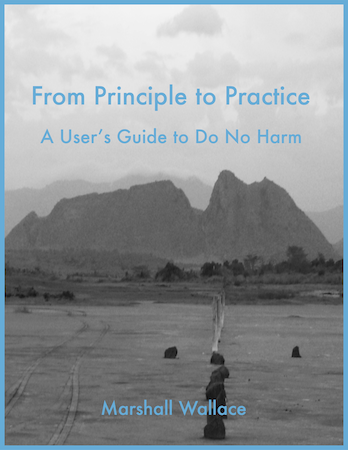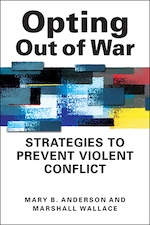I'm Marshall Wallace. I build significant positive lasting change.
...
I spent a lot of years around the world working on change with some of the largest organizations--and some of the smallest--until my kid asked me to stop. She's off to college and I can put up with a little travel.
...
I've run global research projects. I turned the insights from research into training programs. I've trained thousands of people to make use of the research learning. I trained over three hundred trainers around the world to carry on the training work.
...
I've written a couple of books and a lot of articles, mostly about the causes of conflict and the causes of peace. I've consulted with governments, UN organizations, international and local NGOs all over the world, as well as companies large and small.
Work I'm proud of
Opting Out of War: Strategies to Prevent Violent Conflict
In this book, we looked at communities in civil wars that found ways to "opt out" of the violence. These are their strategies.
From Principle to Practice
A pattern language for interventions, from humanitarian or development aid at any level, by any actor, to government programs and corporate outreach.
The Social Change Matrix
A practical model of how change happens. I've used the SC Matrix to run programs and political campaigns. It's magic.
Practical Legitimacy
Legitimacy is the relative willingness of someone to act on a request. The more likely they are to act willingly, the more legitimacy that government, institution, organization, or person has. This model explains the components necessary to generate willing, cooperative legitimacy, as opposed to unwilling, coerced action.
-
I'm writing a book. How to Stop a Civil War is about strategies and tactics from around the world to either stop conflict or to mitigate it. Some advice right now:
- The stakes matter. The only sure way to prevent the worst from happening is to imagine it and then plan for it. The surest way for the worst to happen is to believe that everything will work out.
- Pick a thing to work on. After imagining the worst, there’s too much for one person to do. Pick the thing that (a) matters to you and (b) you have the capacities to work on. If you need to acquire skills, go acquire them (skill acquisition is working on your thing).
- Pick a non-conflict identity. You have a lot of potential identities available from your country’s history. Pick one and use it. Personally, I think “patriot” is a good one, as long as you emphasize the community, coming-together to build a nation aspect.
- Tell your leaders to lead. They need to lead on stating the stakes, connecting and coordinating groups, helping groups get the resources they need, and facilitating conversations about strategy. Leaders need to assure communication is taking place across ALL sides, no matter how difficult that seems.
- Open your lines of communication. Be in touch with your friends and family. Let them know what you think about the worst and what you’re doing to prevent it. Get to know your neighbors and build a local identity.
- Emphasize the Rule of Law. Use capital letters when you speak. Emphasize community norms and values. Communities don't have to tolerate those who violate them.
- Support educational and economic opportunities. Don't do this just for yourself, but for your neighbors and your nation. This too shall pass and we want to be able to move into the future on a solid footing. Plus, these things might stop a civil war.
- Don't fall for misinformation. Double-check. Don't fall for disinformation! If it seems outrageous, it probably isn't true.
Come back here to see how the book is going. I'll try to set up a mailing list for better communication. Because it is the easiest to get started on, I’m going to emphasize one piece of the above advice: set up good communication systems with friends, family, neighbors, leaders both political and otherwise, and even with your opponents.
-
I have acquired an interesting skillset, but it all boils down to one thing:
- I like people
- I have executive experience as President of a non-profit, COO of a firm, and Founder/CEO of a company.
- I led two global research projects, managing dozens of people directly, and facilitating coordination with hundreds of organizations across multiple countries. I wrote several successful grant proposals to get these off the ground and keep them going.
- I’ve written books and articles that are widely used, not just cited.
- I homeschooled my kid during the pandemic. Keeping up with an 8th grader is no joke. She was well-prepared for 9th grade though!
- (And, heck, I built this website. In fact I've built a lot of websites...starting in 1993 with Mosaic. I've been around.)
Drop me a line.

